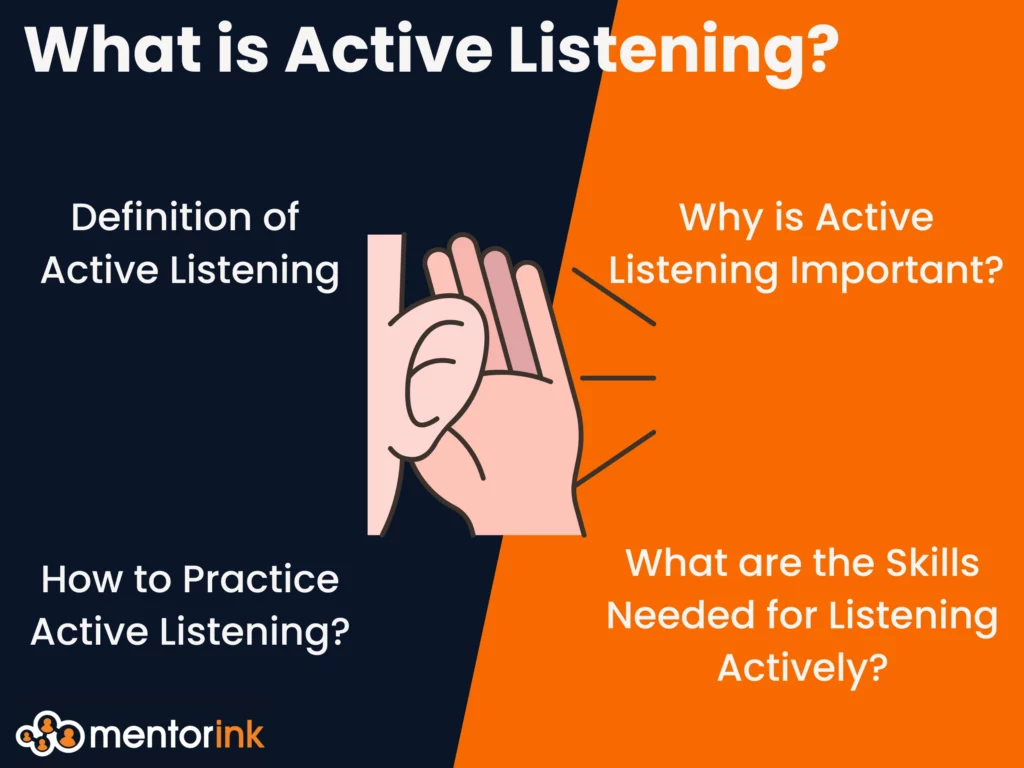
Active listening is an important interpersonal skill that involves focusing on, understanding, and responding to the speaker in a conversation. It goes beyond simply hearing what is said; it requires participation, attention, and feedback to make sure the message is accurately perceived and understood. They are needed to build effective relationships, resolve conflict, and maintain mutual respect in both personal and professional settings.
Definition of Active Listening
Listening actively means listening carefully while someone speaks, summarizing and reflecting on what they say, and refraining from criticizing or advising.
Active listening involves more than just hearing the words; this also includes tracking the speaker’s body language, detecting voice, and understanding how one feels conveyed by the speech.
You may also read 6 Tips to Help You Communicate Better to get more information about listening.
How to Practice Active Listening?
Active listening requires specific approaches and attitudes. So in order to actively engage in a discussion, you must have the following:
- You Should Give Full Attention
Giving your full attention to the other speaker is the first step in actively listening. This means avoiding and eliminating distractions, such as phones or other devices, and focusing solely on the discussion. By being completely present, you show the speaker that you are invested in what they are saying.
- You Should Use Clues
Clues, especially non-verbal clues such as nodding, eye contact, and leaning slightly, can be considered as a signal to the speaker that you are listening to the speaker. Those mimics are the key to creating an adequate listening environment.
- Reflection
One of the most effective active listening techniques is to reflect on and paraphrase what the speaker has said. This may involve summarizing the main points or repeating key phrases to make sure you understand.
You might say, for example, “So what I’m hearing is that you’re concerned about…” This shows that you are actively processing the information and ensures that you have understood the message correctly.
- Asking Questions
By asking open-ended questions, the speaker is encouraged to elaborate on his or her thoughts and feelings. This not only deepens the conversation. It also gives you more context and insight.
Why is Active Listening Important?
In both personal and professional settings, actively listening is critical for several reasons. First, it establishes trust and relationship between individuals. When people feel truly heard and understood, they are more likely to open up and share honestly. This leads to stronger relationships and more effective communication.
In the workplace, active listening can improve collaboration and teamwork. When employees practice it, they are better able to understand each other’s perspectives, which leads to more informed decision making and problem solving.
It also plays an important role in emotional intelligence. By tuning in to the emotions behind the words, listeners can be more empathetic and supportive.
This is especially important in leadership roles. Hearing and responding to team members’ concerns is key to maintaining morale and motivation.
What are the Skills Needed for Listening Actively?
There are certain characteristics that active listening requires. These features can be listed as follows;
- Empathy: The ability to understand and share the feelings of others. In active listening, empathy allows you to connect with the speaker on an emotional level, making them feel valued and understood. By acknowledging the speaker’s emotions, you can respond in a way that is supportive and validating.
- Patience: Patience allows you to fully hear the speaker’s message without rushing to judgment or response, and is critical to active listening. Patience also includes giving the speaker the time they need to express themselves, even if it takes longer than expected.
- Critical Thinking: Critical thinking in active listening involves analyzing the information presented and evaluating its significance. This skill can help you to ask appropriate questions, to identify the underlying issues, and to provide thoughtful feedback. It ensures that your responses are well-informed and constructive.
- Nonverbal Communication: Effective eye contact, appropriate eye expressions, and observing the speaker’s body language are essential components of active listening. Such skills help you read between the lines and understand the full context of the conversation.
- Feedback: In active listening giving feedback can be considered another effective active listening skill. Feedback can be verbal or nonverbal such as summarizing or paraphrasing, as well as nonverbal feedback, like nodding or smiling.


